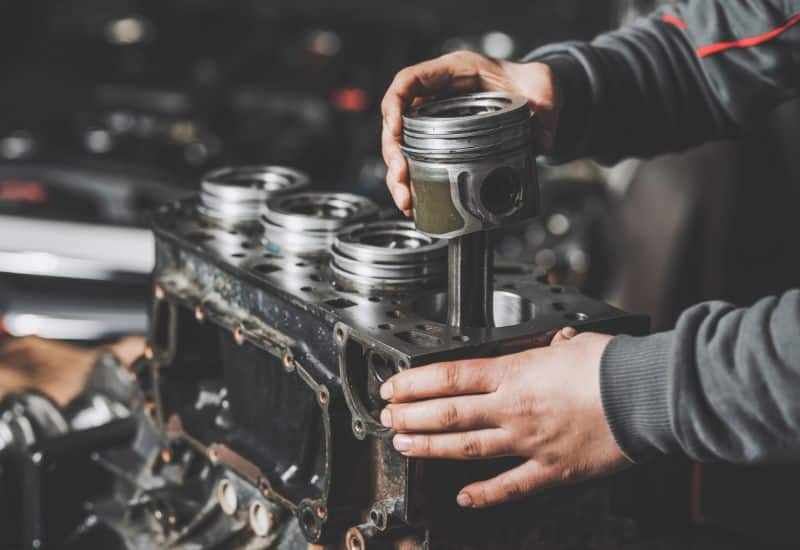
One day your car is driving along seemingly fine, then you step on the gas to accelerate hard, and suddenly the engine starts knocking. Even the slightest amount of knocking or pinging sounds can be extremely worrying when this happens.
You’re right to be concerned about the potential damage caused by an engine knock.
Most cases of engine knocking occur when the fuel/air mixture in the cylinder ignites prematurely, causing small, unregulated explosions that are out of sync with the cycle of the engine. In other cases, knocking car engines is a result of a serious mechanical fault such as worn-out engine bearings or a bad serpentine belt.
Left unchecked, even a minor case of engine knocking can cause major damage to your engine. So, it’s never something to take lightly.
To better understand what does a knocking engine mean, the consequences, and how to prevent it, we’ll need to investigate the internal combustion process, as well as the things that commonly cause an engine to knock.
What Does Knocking In The Engine Mean?
Engine knocking is somewhat of a blanket term used to describe an incident where the fuel in a car’s cylinders burns unevenly. It’s often related to high temperatures and pressures within the engine and other mechanical faults that can affect the way fuel-air fixture ignites.
Normally your car’s cylinders fire with a perfectly balanced mixture of air and fuel; the spark plug and the rotation of the engine have each piston firing in sequence. When premature ignition occurs, the fuel can burn in small, unregulated pockets all at once. Sometimes exerting forces so great that it can damage the engine.
Engine knocking is most likely to occur at a lower speed, high-torque conditions. This might be something like accelerating to get up to highway speed, taking off quickly at a light, or attempting to tow something heavy up a suddenly changing incline.
6 Reasons Why Your Engine Is Knocking
Engine knocking can be caused by several different things, but a few suspects occur more than others.
The following are six of the most likely causes of engine knocking and why getting it fixed as soon as possible is important.
1: Engine Knock Caused by a Timing Problem
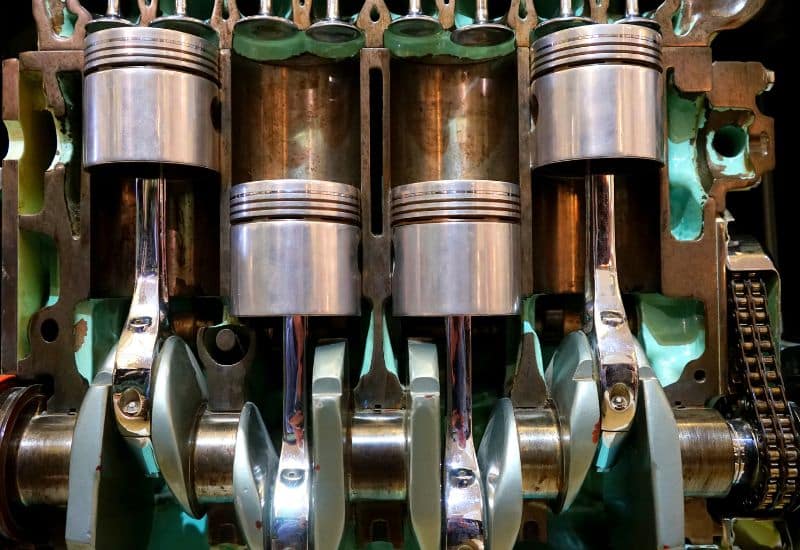
The timing of an internal combustion engine relies on the spark plug firing at a precise point in the engine’s cycle. In modern-day vehicles, this is all controlled by the internal computer. If there’s a timing problem within the engine’s process that’s causing the spark to fire at the incorrect time, it can cause multiple detonations in the cylinder, which produces an engine knock.
The symptoms of engine knock caused by a timing problem tend to get worse over time. This includes things like:
Consequences of Driving with a Bad Timing Problem
The consequences of driving a car with bad timing tend to get worse the longer you procrastinate the fix. This starts with poor fuel economy, a loss of power, and an increased risk of overheating. As the engine starts to idle roughly and misfire, it can damage the pistons, cylinders, and other vital engine components.
Recurring misfires can also allow unburned fuel to pass through to the exhaust manifold. This can severely damage the catalytic converter and other sensitive exhaust system components.
2: A Bad Knock Sensor
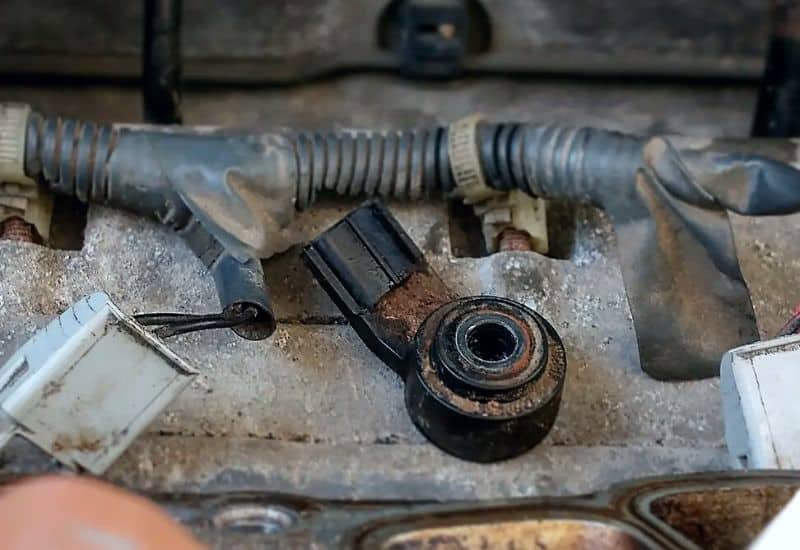
The computer controls inside modern-day cars are so sophisticated that most vehicles these days have a specific knock sensor. Its responsibility is to monitor the performance of the fuel injectors, the engine timing, and other internal combustion factors like the fuel-to-air ratio.
Should the knock sensor detect an engine knock it sends information to the car’s ECU to correct the problem automatically.
If your engine is knocking for any reason, chances are also good that something has gone wrong with the knock sensor and/or its relationship to the ECU.
Even if you can quickly determine the cause to be something physical or mechanical, it’s a good bet that you also need to check the knock sensor at a point in the diagnostic process.
The Consequences of Driving with a Bad Knock Sensor
Driving with a bad knock sensor can score pistons, leading to overheating problems and other engine damage that are increasingly costly to repair. These costs are very high compared to the low overall cost of simply replacing the knock sensor
3: Engine Knock Caused by a Lean Fuel/Air Mixture
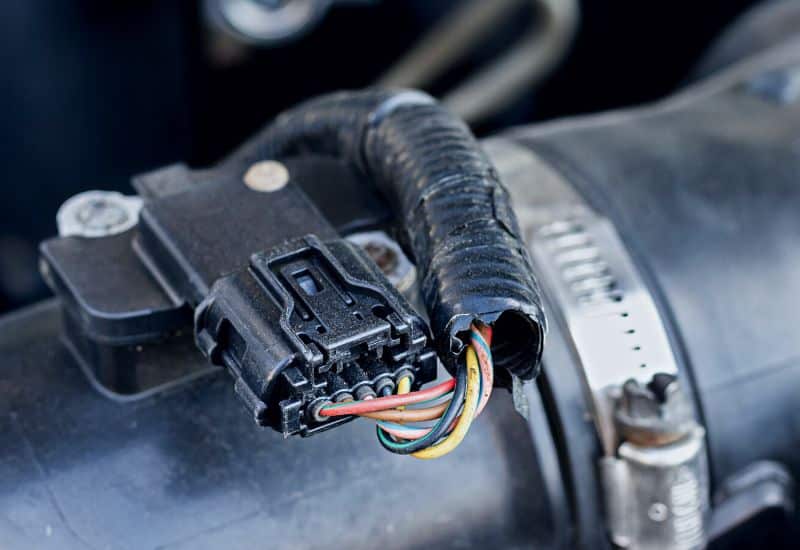
If your car has a problem with one of the oxygen sensors, the mass airflow sensor, one or more of the fuel injectors, or a problem with the fuel pump can lead to an overly lean fuel/air mixture in the engine. This can mean there isn’t enough fuel or too much air.
The mixture can’t burn fast enough for the internal combustion cycle without enough fuel in each cylinder. This can eventually lead to multiple detonations, which manifest as engine knock.
Symptoms of a Lean Fuel/Air Mixture
The Consequences of Knocking Caused by a Lean Fuel/Air Mixture
Knocking caused by a lean fuel/air mixture can easily damage multiple engine components.
Running lean for even a short period of time can score the pistons. Not to mention the damage caused throughout the engine by overheating. Left too long, you can even start to melt parts of the pistons themselves.
4: Rod Knock Caused by Worn Bearings
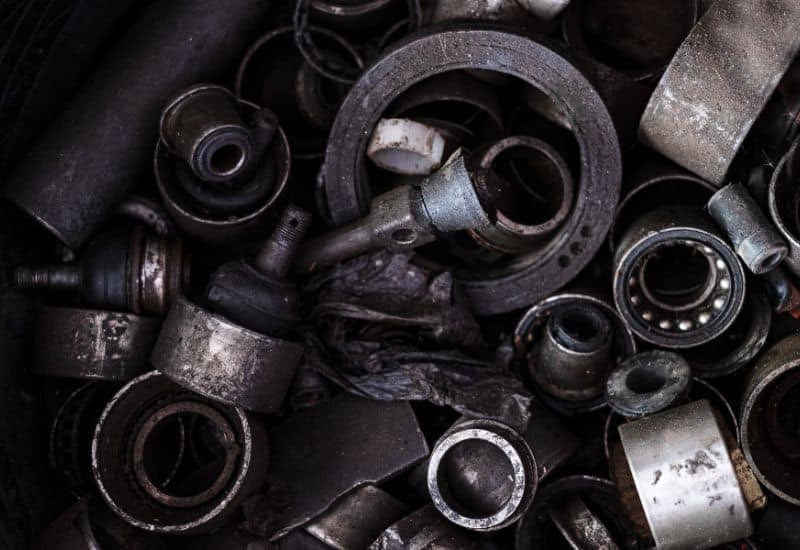
Rod knock is another form of engine knocking that is often caused by worn bearings. When the engine’s pistons move up and down, they turn the crankshaft, transferring the power to the mechanical process that inevitably turns the wheels. Special rod bearings ensure the smooth movement of each piston.
It’s possible for these bearings to be worn out over time, which can cause the piston to come slightly out of position. As this starts to happen, the pistons can start to rattle against the crankshaft, which sounds very similar to classic engine knocking caused by a fuel-air imbalance.
Symptoms of Rod Knock Caused by Bad Bearings
The Consequences of Rod Knock Cause by Bad Bearings
Driving with rod knock caused by bad bearings can be catastrophic. You could eventually throw a rod, damage the crankshaft, damage one or more pistons, and even suffer catastrophic engine damage leading to total engine failure.
5: Bad Tensioners And/or Pulley Problems
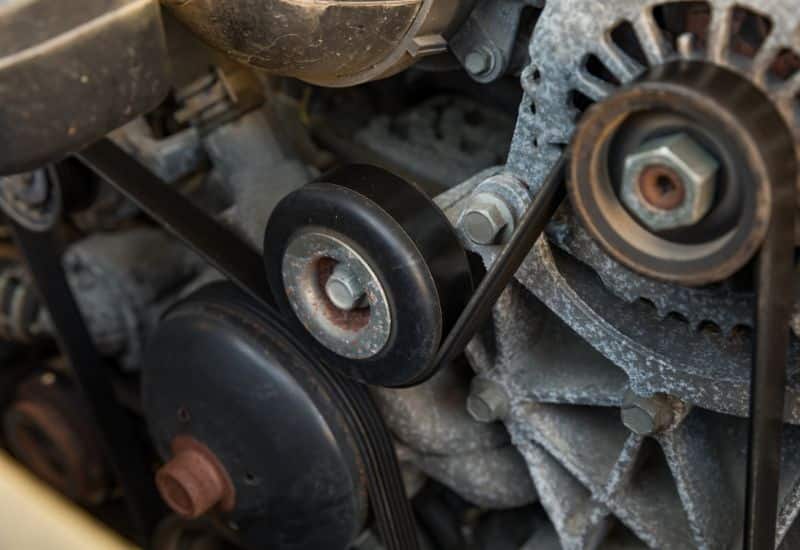
In an ironic twist, sometimes engine knocking sounds don’t come from inside the engine itself. A bad tensioner or a pulley problem in an accessory belt can be at fault. As the engine rotates through its normal cycle, it turns a serpentine belt or accessory that’s connected to a series of pulleys. To maintain the smooth flow of operation, this belt needs to be under a precise amount of tension.
If the serpentine belt is too tight and becomes stretched out or worn out to the point of being too loose to maintain its natural motion, it can affect the normal operation of the engine.
A lot of the time, a problem like this is due to a fault in the tensioner. In the case of an overly tight belt, it can also pull one of the pulleys and becomes bent out of shape or out of its correct alignment.
When this happens, you will often notice odd clicking, rattling, or even slapping noises that sound very much like a classical case of engine knock.
Symptoms of Knocking Caused by a Bad Tensioner Include:
Consequences of Driving with a Bad Tensioner
Driving a car that’s knocking due to a bad tensioner can and likely will lead to total belt failure. It can also damage belt-driven accessories like the alternator. While you might be able to get away with it for a week or so, it’s best to get it fixed as soon as possible.
6: Engine Knock Caused by Low Octane Fuel
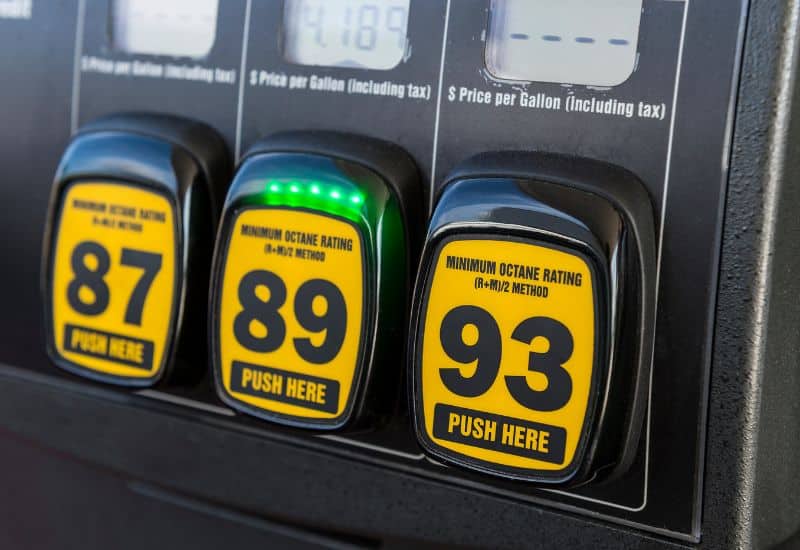
An uncontrolled imbalance in the fuel-to-air ratio can cause a detonation knock. This is caused by detonations in more than one place at a time when fuel ignites too early in the internal combustion process.
Many “Performance-Tuned Engines” have a specific rating that requires specific high-octane fuels.
If you happen to put a low octane fuel in an engine like this, it won’t always burn uniformly, causing engine knock. This can also happen if you’ve let the car sit too long, and the fuel in the tank has started to break down a little.
Consequences of Knocking Due to Low Octane Fuel
Driving with low octane or degraded fuel in a performance-tuned engine can cause increasing damage to the engine itself. It can also badly damage the car’s emission control system as time goes on.
It’s also worth bearing in mind that a lot of cars with performance-tuned engines have a manufacturer’s warranty with language that voids coverage if low-octane fuel is used.
How to Repair Engine Knock
The source of the engine knock and the damage done to engine components will directly impact the type of repair you need to do.
Sometimes this is as simple as replacing a faulty knock sensor or making adjustments to the ECU.
Other times it can be quite expensive and beyond what the average DIY mechanic has the tools and skills to handle.
Fixing Engine Knock Caused by a Timing Problem
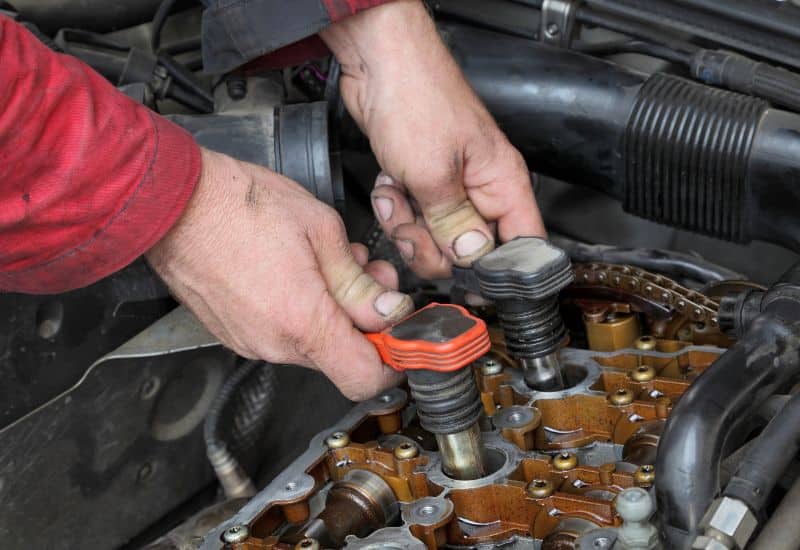
If you catch it early, you can usually fix the engine knock caused by a timing issue by simply adjusting the timing belt. However, this is rather deep in the engine and might require special tools that you likely don’t have at home.
The cost to have a mechanic replace a timing belt and/or adjust the engine’s timing ranges from $350 to $600.
Fixing a Bad Knock Sensor
The easiest way to fix a bad knock sensor is to replace it. You can usually find the part for $75 to $150.
The cost to have a knock sensor replaced by a professional mechanic can vary from $150 to $250.
Fixing Engine Knock Caused by a Lean Fuel-to-Air Mixture
Engine knock caused by a lean fuel/air mixture is usually related to either a vacuum leak that allows too much air into the combustion chamber and/or a fuel system problem, such as a failing fuel pump.
You can start by following the various vacuum and air intake lines. Look for any cracks, holes, bad connections, or loose clamps. Then replace them or repair them and take the car for a test drive.
If the knocking problem persists from the lean fuel/air mixture, you might need to replace the fuel pump.
The cost to repair or replace vacuum lines in a car’s air intake can be as cheap as $75, or as much as $550. You can fix most minor problems, whereas a major failure might require a professional mechanic with high labor costs.
Repairing Rod Knock Caused by Bad Engine Bearings
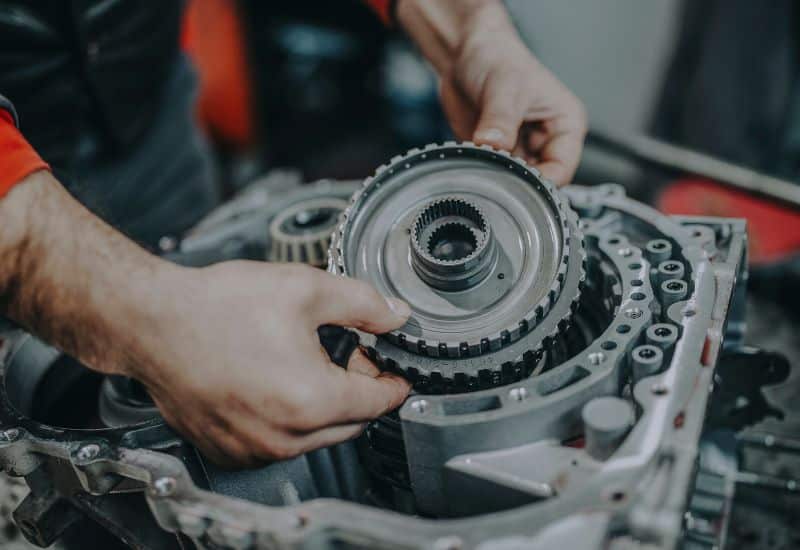
Rod knock is probably the most expensive type of engine knock to have to replace. Most severe cases of rod knock require you to replace the old worn-out bearings with new bearings. Along the way, other work usually needs to be done to the pistons and/or the crankshaft.
These components are found deep in the engine, making it a very time-intensive repair. It’s not the sort of thing that the average home mechanic has the tools, skills, or equipment for.
The cost to have a rod knock problem professionally repaired by a mechanic can range from $2,00 to as much as $3,500.
Repairing Engine Knock from a Bad Tensioner or Pulley Problem
An engine knock sound caused by a bad tensioner, belt, or pulley problem is usually a cheap fix. If you catch it early enough, it might be as simple as replacing the serpentine belt or slightly readjusting the tensioner arm.
If this doesn’t work, you’ll likely have to replace the bad tensioner or the accessory pulley. You might be able to do this in an hour or two with the right tools and replacement parts.
The cost for parts to replace a bad tensioner and/or pulley will run you around $80 to $250.
The cost to have a bad tensioner and/or pulley replaced by a mechanic ranges from $150 to $400.
Fixing Engine Knock Caused by Low Octane Fuels
If you have a car that has a “Performance Tuned Engine,” it likely has a specific octane rating fuel requirement. High-octane fuels tend to burn more uniformly, thus naturally resisting knock.
Using the octane-rated fuel in your owner’s manual will usually fix an engine knock problem like this. Though you might need to have the tank drained, especially if the problem is related to fuel degradation.
If you know that the car is going to have to sit for multiple weeks at a time, say if you frequently travel for business, you should consider adding the appropriate fuel stabilizer to the tank.
The cost to have a gas tank drained ranges from $75 to $175 or more, depending on the available service centers in the area.
How to Prevent Engine Knocking
Preventing engine knock starts with good general maintenance habits as well as using high-octane fuel. These two things will go a long way toward preventing problems with lean fuel/air mixture, catching vacuum leaks early, and preventing fuel system issues. It can also help reduce the stress placed on the knock sensor to extend its overall life.
Making sure that you are filling up with gas that is at least 87 octane or the octane rating stated in your performance-tuned car’s owner’s manual will also help prevent engine knock. High-octane fuels help an engine to run smoothly, improving performance and reducing engine knock issues.
When it comes to rod knock, using oil with a high viscosity rating for high-mileage engines will help as your car ages. Then make sure you’re also performing oil changes on time. Though rod knock is one of those things that you might not be able to100% prevent.
Frequently Asked Questions
What Should I Do if the Engine Starts Knocking While Driving?
Engine knocking needs to be addressed immediately, especially if the engine is misfiring at the same time. If it’s a minor case of engine knock, and your oil is low, and you know there’s low-octane fuel in the gas tank, topping up your oil and adding high-octane fuel might be enough to let you limp home.
If the knocking is severe and metallic sounding, you should strongly consider pulling over and having the car towed, as it’s at high risk for severe engine damage.
Is It Worth It To Fix Rod Knock
The cost of replacing rod knock caused by worn-out engine bearings is often prohibitive. Since it can easily cost upwards of $2,000 or more to repair it, and likely comes with other repairs, you’ll have to weigh your decision against the remaining long-term value of the car.
Conclusion
Engine knock is not something you should take lightly. Even a minor case of engine knock caused by a faulty knock sensor or low-octane fuel can have major consequences in severe engine damage.
Inspecting the engine can help you gauge the cause of the engine knock and whether you can repair it yourself. Look for loose vacuum houses, air intake components, and signs of a worn or overly tight serpentine belt. These are things that you can probably fix on your own.
Though you should expect that the knock sensor will also need to be replaced, whatever the fault is causing the engine to knock in the first place.
If the knocking is more serious, frequent, loud, metallic, and/or causing misfires, the cause might be deeper in the engine. A timing problem, bad timing chain, or a catastrophic engine bearing failure leading to rod knock are all things that are likely going to be beyond what you can fix on your own.

Written By
Jason Farrell
Jason Farrell is a certified master technician, the editor of Mechanic’s Diary in Pittsburgh, Pennsylvania. He is ASE (Automotive Service Excellence) certified and earned a Bachelor’s Degree in Automotive Technology from Pittsburg State University. With nearly 18 prior years of experience in the automotive field, he has extensive knowledge about Domestic, European, and other foreign makes and models of cars and light trucks. Jason’s experience working as a technician and service manager at dealerships, gave him the experience and know-how of most aspects of inspection, diagnosis, and repair from engine and drivability to electrical, HVAC, brakes, steering and suspension and everything in between.
